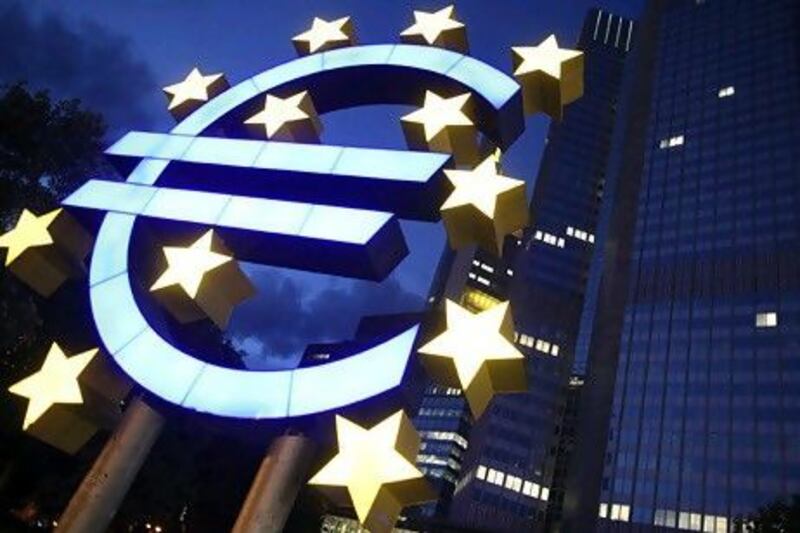The revelation that the US Federal Reserve secretly poured US$1.2 trillion (Dh4.4tn) in emergency funding into the US banking system over the past three years has sparked off a lively debate over the role of central banks in the financial system.
Finance:
Industry Insights Exclusives you can bank on from The National's premium content. Learn More
Few question the importance of the central bank in minting currency or setting interests rates to keep prices steady. But some academics and politicians are increasingly arguing that its role as the lender of last resort may encourage risky lending.
News of the scale of the Fed's intervention, reported by Bloomberg News last month, comes as criticism mounts from candidates seeking the nomination of the Republican party for next year's presidential elections.
"Making monetary policy to cover up bad fiscal policy is bad public policy," Rick Perry, the Texas governor and Republican hopeful, told CNBC television in September. "And that's what we're seeing: a Fed that is getting involved in things that, frankly, it does not need to be involved with."
A rival candidate, the libertarian Congressman Ron Paul, has written a book, End the Fed, which calls for the Fed's abolition.
Under this scenario, more banks would fail, because they would live or die by their own lending policies without a safety net - but the government would be spared the responsibility of paying for bankers' mistakes, encouraging bankers to take fewer risks.
The debate on the other side of the Atlantic could not be more different.
The European Central Bank (ECB) has been criticised heavily for its inability to act as a lender of last resort to euro-zone countries in the same manner as national central banks. Political paralysis among euro-zone leaders means the ECB's lack of action is creating further threats to the global economy, said Mark McFarland, an economist at Emirates NBD.
"The ECB is essentially fighting against the political bureaucracy in Europe [that is] trying to bail out the banks," he said.
But if the ECB refuses to intervene and banks are unwilling to accept defaults from beleaguered euro-zone nations, who will be hurt most?
"It'll fall on them all in the end," Mr McFarland said. "I don't see how this can be resolved without us experiencing another leg down that's probably more volatile than the one we had already."
Had central banks not shouldered the costs of the global financial crisis, it is likely even more big banks would have failed.
The Fed provided $1.2tn in emergency loans to 190 firms in the US banking system during the financial crisis, according to details of the Fed's secret liquidity programme. The supply of emergency liquidity came in addition to the $700bn provided by the Troubled Asset Relief Programme, intended to recapitalise the banks after the collapse of Lehman Brothers in September 2008.
Nicolas Sarkozy, the French president, has clashed with Angela Merkel, his German counterpart, over whether the ECB should intervene in the euro-zone debt crisis with purchases of sovereign debt.
Germany, haunted by the memory of hyperinflation of the Weimar Republic in the 1920s, fears that allowing the ECB to finance heavily indebted euro-zone nations' budgets by printing money risks an uncontrollable weakening of the euro and a surge in costs across the continent.
Central banks across the world should be careful about giving in to political calls to action while addressing threats to the financial system, said William Rhodes, a senior adviser to Citigroup and the World Economic Forum.
"An underestimated factor in moving economies from the emergency hospital ward on to paths of sustained recovery has been the independent approaches of central banks," said the seasoned financial diplomat, who built a reputation for battling debt crises in Latin America and Asia in the 1980s and 1990s.
"Prudent, efficient central banks, coordinating policies quietly and efficiently across national borders, are exceptionally important today."
Central bankers acted in unison last week after six of the world's major central banks, including the Fed, the ECB and the Bank of England, took coordinated action to provide emergency liquidity to the world's banks.
Markets immediately signalled their approval, with the MSCI World index of global equities jumping 3.9 per cent to 1,184.60 on Wednesday following the announcement.
But central banks' ability to distance themselves from political criticism is crucial in allowing them to address economic weakness, Mr Rhodes said.
"By their very independence from politics, they have secured public confidence and used this to address fundamental economic weakness and chart longer-term consistent monetary policies that have supported growth, countered inflationary pressures and provided environments that have encouraged investment."
Mr Rhodes said Jean-Claude Trichet, the recently retired ECB president, pursued policies that sought to ensure support for the euro zone in a time of "exceptional tests".
Working together, the Fed and the ECB combined forces to contain what could have become "a very dangerous situation", Mr Rhodes said.
twitter: Follow and share our breaking business news. Follow us





